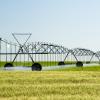
Options Summer 2020: IIASA researchers used systems analysis methods to measure trade interdependencies between US states and found that the country’s current food supply chain is often not optimized for using available natural resources.
Trade between nearby states in the US is mutually beneficial and is at the heart of interstate commerce. However, growing concerns over natural resources make interstate food transfers prime for analysis. Groundwater aquifers are, for instance, often shared by vast regions and increasing reliance on these water sources immediately impact agriculture and trade for all nearby states.
In a recent study, Advanced Systems Analysis Program researcher Nemi Vora and her coauthors used systems analysis methods to measure trade interdependencies between states. Using pointwise mutual information (PMI), the team measured expected trade versus statistical expectations based on the structure and flow of trade networks. They found that overreliance on common aquifers for irrigation poses a threat of water shortage for food supply in Texas and neighboring states.
Additionally, the study found that states with ample water resources rely on fossil fuels like diesel and gasoline for irrigation. This means avoiding water scarcity will require a potential tradeoff between resources needed to procure water for irrigation and investing in equipment that will reduce emissions.
“Our current food supply chain is often not optimized for using available natural resources,” explains Vora. “Systems analysis methodologies, such as combining PMI with environmental life cycle assessment can provide a quick estimate of alternative options given current trade, without going into detailed economic models, and help policymakers continue to meet these demands in ways that are both sustainable and environmentally friendly.”